327 books about Death and 5
start with N
327 books about Death and 5
327 books about Death
5 start with N start with N
5 start with N start with N
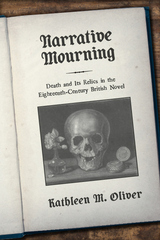
Narrative Mourning
Death and Its Relics in the Eighteenth-Century British Novel
Kathleen M. Oliver
Bucknell University Press, 2020
Narrative Mourning explores death and its relics as they appear within the confines of the eighteenth-century British novel. It argues that the cultural disappearance of the dead/dying body and the introduction of consciousness as humanity’s newfound soul found expression in fictional representations of the relic (object) or relict (person). In the six novels examined in this monograph—Samuel Richardson's Clarissa and Sir Charles Grandison; Sarah Fielding's David Simple and Volume the Last; Henry Mackenzie's The Man of Feeling; and Ann Radcliffe's The Mysteries of Udolpho—the appearance of the relic/relict signals narrative mourning and expresses (often obliquely) changing cultural attitudes toward the dead.
Published by Bucknell University Press. Distributed worldwide by Rutgers University Press.
Published by Bucknell University Press. Distributed worldwide by Rutgers University Press.
[more]
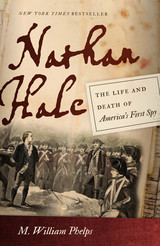
Nathan Hale
The Life and Death of America's First Spy
M. William Phelps
University Press of New England, 2015
Although famous for his purported last words—“I only regret that I have but one life to lose for my country”—few people know the real Nathan Hale. M. William Phelps brings into focus the life of this famed patriot and first spy of the American Revolution, charting Hale’s rural childhood, his education at Yale, and his work as a schoolteacher. Like many young Americans, he was soon drawn into the colonies’ war for independence and became a captain in Washington’s army. When the general was in need of a spy, Hale willingly rose to the challenge, gathering intelligence behind British lines on Long Island, and in the end bravely sacrificing his life for the sake of American liberty. Using Hale’s own journals and letters as well as testimonies from his friends and contemporaries, Phelps depicts the Revolution as it was seen from the ground. From the confrontation in Boston to the battle for New York City, readers experience what life was like for an ordinary soldier in the struggling Continental Army. In this impressive, well-researched biography, Phelps separates historical fact from long-standing myth to reveal the truth about Nathan Hale, a young man who deserves to be remembered as an original American patriot.
[more]
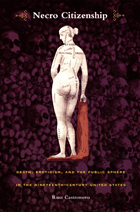
Necro Citizenship
Death, Eroticism, and the Public Sphere in the Nineteenth-Century United States
Russ Castronovo
Duke University Press, 2001
In Necro Citizenship Russ Castronovo argues that the meaning of citizenship in the United States during the nineteenth century was bound to—and even dependent on—death. Deploying an impressive range of literary and cultural texts, Castronovo interrogates an American public sphere that fetishized death as a crucial point of political identification. This morbid politics idealized disembodiment over embodiment, spiritual conditions over material ones, amnesia over history, and passivity over engagement.
Moving from medical engravings, séances, and clairvoyant communication to Supreme Court decisions, popular literature, and physiological tracts, Necro Citizenship explores how rituals of inclusion and belonging have generated alienation and dispossession. Castronovo contends that citizenship does violence to bodies, especially those of blacks, women, and workers. “Necro ideology,” he argues, supplied citizens with the means to think about slavery, economic powerlessness, or social injustice as eternal questions, beyond the scope of politics or critique. By obsessing on sleepwalkers, drowned women, and other corpses, necro ideology fostered a collective demand for an abstract even antidemocratic sense of freedom. Examining issues involving the occult, white sexuality, ghosts, and suicide in conjunction with readings of Harriet Jacobs, Ralph Waldo Emerson, Frederick Douglass, Nathaniel Hawthorne, and Frances Harper, Necro Citizenship successfully demonstrates why Patrick Henry's “give me liberty or give me death” has resonated so strongly in the American imagination.
Moving from medical engravings, séances, and clairvoyant communication to Supreme Court decisions, popular literature, and physiological tracts, Necro Citizenship explores how rituals of inclusion and belonging have generated alienation and dispossession. Castronovo contends that citizenship does violence to bodies, especially those of blacks, women, and workers. “Necro ideology,” he argues, supplied citizens with the means to think about slavery, economic powerlessness, or social injustice as eternal questions, beyond the scope of politics or critique. By obsessing on sleepwalkers, drowned women, and other corpses, necro ideology fostered a collective demand for an abstract even antidemocratic sense of freedom. Examining issues involving the occult, white sexuality, ghosts, and suicide in conjunction with readings of Harriet Jacobs, Ralph Waldo Emerson, Frederick Douglass, Nathaniel Hawthorne, and Frances Harper, Necro Citizenship successfully demonstrates why Patrick Henry's “give me liberty or give me death” has resonated so strongly in the American imagination.
[more]
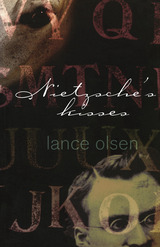
Nietzsche's Kisses
A Novel
Lance Olsen
University of Alabama Press, 2006
Nietzsche's Kisses is the story of Friedrich Nietzsche's last mad night on earth. Locked in a small room on the top floor of a house in Weimar, the most radical and influential of nineteenth-century German philosophers hovers between dream and wakefulness, memory and hallucination, the first person, second, and third, past and present, reliving his brief love affair with feminist Lou Salome, his stormy association with Richard Wagner, and his conflicted relationship with Lisbeth, his radibly anti-Semitic sister. Here is an authoritative portrait of the Nietzsche we know and the Nietzsche we don't. His titantic ego, suppressed, squelched, and sealed up within him, all but unknown to his acquaintances, creates a maniacal and raging giant inside his own skull that is mysterious and unnerving. Both stylistically and formally innovative, the prose in Nietzsche's Kisses is surprising and rich. The result is a vivid, complex experience of Nietzsche's final hours.
[more]
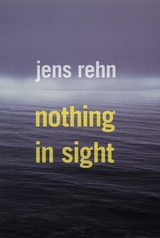
Nothing in Sight
Jens Rehn
University of Chicago Press, 2005
It is 1943. A German submarine commander and an American pilot are stranded on a rubber life raft, floating alone in the middle of the ocean, with nothing between them but a bottle of whiskey, some cigarettes, a few chocolate bars, and a pack of chewing gum. Both sit, hoping to be rescued, but there is no hope in sight. The stage is thus set for this hypnotic existentialist parable, a rediscovered classic in the literature of World War II.
In a terse, almost clinically exact style, Nothing in Sight distills the brutal essence of what it is to die alone. Much more than a story of war, this short novel presents the memories, dreams, and hallucinations of two soldiers as they drift toward death. With nothing in sight on the horizon, Jens Rehn directs our view inward, into the minds of both men as they question the meaning of life, the existence of God, and the possibility of enduring human relationships. As the drama unfolds, each man recalls fragments of his past through the delirium of thirst and pain. The American soldier, his arm severed, dies first of gangrene. The German dies in agony a week later. Their life raft sinks into the vastness of the ocean.
Reissued two years ago in Germany, Nothing in Sight was hailed by critics there as a singular achievement. The work is presented here in a crystalline English translation for the first time, given new life for generations of readers to come.
In a terse, almost clinically exact style, Nothing in Sight distills the brutal essence of what it is to die alone. Much more than a story of war, this short novel presents the memories, dreams, and hallucinations of two soldiers as they drift toward death. With nothing in sight on the horizon, Jens Rehn directs our view inward, into the minds of both men as they question the meaning of life, the existence of God, and the possibility of enduring human relationships. As the drama unfolds, each man recalls fragments of his past through the delirium of thirst and pain. The American soldier, his arm severed, dies first of gangrene. The German dies in agony a week later. Their life raft sinks into the vastness of the ocean.
Reissued two years ago in Germany, Nothing in Sight was hailed by critics there as a singular achievement. The work is presented here in a crystalline English translation for the first time, given new life for generations of readers to come.
[more]
READERS
Browse our collection.
PUBLISHERS
See BiblioVault's publisher services.
STUDENT SERVICES
Files for college accessibility offices.
UChicago Accessibility Resources
home | accessibility | search | about | contact us
BiblioVault ® 2001 - 2024
The University of Chicago Press









